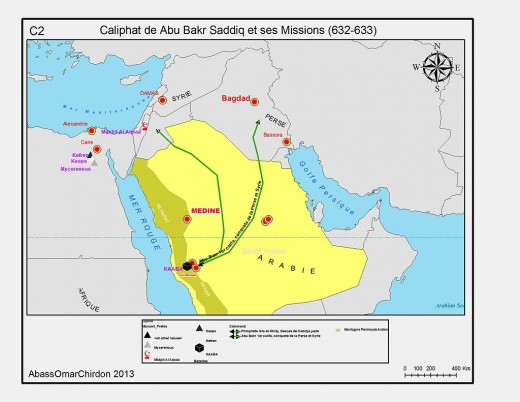Pre-Emptive Strike
Changing Gears
It has been a nice interlude, not ordering ships and planes into the Middle East, where our best interests are being threatened and gradually undermined. At first, like many hawks on television, I thought something was wrong with the administration. It did not get it. This was a no-brainer. Join the battle. Win it, too -- with superior force. But the preference for talk and negotiations actually buys valuable time in order to reevaluate how to engage a different sort of enemy, or hodgepodge groups of enemies, likely to remain dead set against us till the end of time. There has to be another way of fighting that is not undone in minutes after we leave, like a cartoon cat in a room filled with playful cartoon mice. That, in a nutshell, is the reason for giving a second look to a concept that seemed to have failed, but actually set a very good precedent for doing battle against anti-American forces in the 21st century.
As to the heated dispute over boots on the ground, they are needed as required. The more important question has to do with how to co-exist with millions of people inculcated with the notion that we are Satanic, hence fair game. Already Coptic Christians, dating back to the fifth century A.D., have been executed without resistance. So have Ethiopian and Libyan Christians. Other Christians have fled their homes in search of asylum. Moreover, air attacks have not cramped ISIS's style, which is not only resilient but extremely barbaric. Our forces must train to confront an army that belongs more to the ancient world than the modern. No one wants to say it ("no prisoners"), in so many words, but every single member of ISIS must be eliminated.
The Not-So-Friendly Skies of Iraq

The Future is Now
I also yearn for how things once were when actions complemented ideals. A sense of proportion prevailed. It was still extant in the 1990s. The coalition to confront Iraqi aggression against Kuwait would go only so far and no farther. Baghdad could have been taken, but it was deliberately left intact. Since then, times have drastically changed. In matters of war, to wait for a smoking gun is to commit suicide. A Pearl Harbor, sinking of a Lusitania, or, for that matter, a Bay of Tonkin, belongs to the past. Nevertheless, a pre-emptive strike is not always warranted. To simply be fast on the trigger does not suffice. Irregardless, the world is once again as hostile as it ever was. No one speaks of a peace dividend anymore.
Still, it seems fair to explore the possibility that perception is an insurmountable problem for the average citizen -- my own particular situation, too. Just as ISIS was gaining ground in the news media, riots erupted in American cities. Soon thereafter, race relations rather than foreign relations were given greater attention. There is nothing reprehensible about this shift except that it created a kind of rift. At the same time, border issues involving children also competed for the eyes and ears of America. Another rift. Thus, not for the first time, citizens had to second guess the priorities of their leaders. America is a large nation, capable of dealing with all three crises simultaneously. But that fact, at the time, neither the media nor the message, or both, to assume a famously stated equivalency, disseminated.
Ali ibn Abi Talib, Muhammad's Successor, Kills an Infidel

Mission Statement
Does anyone know what is going on? It starts out simple. Candidates run for office, including the highest in the land. Their parties have platforms. Candidates spell out their specific positions. Usually they state what they will do if elected. They differentiate themselves from opponents and colleagues alike. Then, later, after the voting, humble concession speeches, and colorful confetti, all hell breaks loose. Generally speaking, however, there are certain goals or principles that apply to either party no matter who is elected. Protection of Israel, for instance, is sacrosanct. Having said this, there are any number of views as to what might follow, such as the rights of Palestinians, settlements, borders, water, roads, walls, check-points, electricity, etc. Because of what has transpired, after ISIS or ISIL began to make itself known, in ways more gruesome than imagined, it might be wise to define or redefine what we will or will not tolerate. Talk of redlining has drifted off. If so, what matters? Certainly we can only imperfectly uphold the sanctity of life. We must play the percentages: there is just too much killing, not just in Syria and Iraq. Having blurred a major redline does not necessarily mean forfeiture. For instance, we have allowed a degree of open season on doomed Christian sects, or others, for that matter, mostly minorities, who fell out of favor. Shall a few be sacrificed for the betterment of many? No, but the involuntary few get larger with each passing day. Or, should we decide to intervene on a case by case basis? Whereas the present administration gives the impression of having passed the buck, there are very concrete reasons why the U.S. should not rush headlong into a quagmire that is thousands of years in the making. ISIS, despite all its destructiveness, might only be bait. Larger, more powerful nations are also watching. ISIS is nonetheless a significant provocateur that has temporarily paralyzed both West and East. So what would our "mission statement" read like, if we had one? To gradually persuade all sides to agree upon the need for peace, harmony, and prosperity? It sounds okay. . . .
7th Century Caliphate

Democracy and Sharia
More than the issue of a pre-emptive strike, the natural inclination for Americans of whatever stamp to embrace the cause of universal democracy, is an even greater stumbling block. Simply put, the world, such as it is, is an unwilling partner for the sake of democracy, regardless of how glorious the ultimate vision looms before the mind's eye. If a large segment of the global population prefers Sharia, then they shall have it. Nevertheless, their leaders must be acceptable and civilized. Their congregants should be free to practice and observe without the use of car bombs as well as hate literature and rallies. Also, they must recognize the fact that their societies are self-contained. They cannot expand by means of conquest. If nothing else, Christians do not want a part of it. One cannot speak for all of them, but the majority favor democracy. Christianity is itself divided. It survives on freedom. As to corporal punishments -- stoning, lopping off hands, gouging out eyes -- zero tolerance is the only solution. This primitive level of existence has long since been superseded.
Few would disagree. But as to what to do about it, nothing but argument ensues. The free world has been brought to a standstill by militants who fight for a bloodthirsty concept of God. No idols are involved, but the same conditions apply. If I were a betting man, I would put my money on more bloodbaths till the accumulation ignites public opprobrium. By then, however, it might be too late. We shall live together, side by side, both the enlightened and medieval. Will it mean the end of the world? Probably not. History proves that people continue to inhabit the earth under all circumstances. But does anyone really want executioners in the planetary neighborhood? Against Middle Eastern turmoil, constantly ripped and torn apart by opposing forces, are scriptural prophecies that describe a hard-won, heavenly triumph, and universal accord. It seems impossible from every realistic angle. But the mystical component of Christianity kept alive by true believers has never doubted itself. This is the hope of the world, not religious pretense.
Mesopotamian Writing circa 2000 BC

The Test Case That Failed
In 1981, Israel bombed the site of an Iraqi nuclear reactor. This was a pre-emptive strike for which there was no hard evidence that might have held up in an international court of law. All that was known was that Saddam Hussein leaned toward violence on a large scale. The acquisition of a nuclear plant, intended for peaceful ends, according to Iraq, was not convincing. Years later, Iran has driven much further into the nuclear realm, all without any effective response that the average citizen knows about. Instead, a talkfest has been blathering for well over a decade. Something appears to be on the horizon, but what? It is pointless to wager on how long a world divided can exist. The best guess is as long as possible.
All one can say, all a journalist can convey, is that we might sleep better at night if Iran's nuclear facilities were suddenly wasted overnight. High speed centrifuges and heavy water do not bleed. They are legitimate targets. This is the test case that actually never took place, akin to, if not the same as, failure. Since the time for a strike has likely passed, reliance on the IAEA has once again become the world's precarious safety latch. Very possibly, nothing apocalyptic will occur. Not for a while. Incredibly, ordinary life goes on along with butchery and explosions. Just today, a hub essay centered on the statistical dead and wounded over the July 4th weekend in Chicago. None can be blamed for not wanting to live in the midst of rampant knife and gunplay, either here or there.
The Holy Land?
In my last hub, I discussed the "terra infirma" of biblical prophecy, especially in regard to Ezekiel, which, in my opinion, only lulls us back into a state of Sunday slumber. Everything is going to be okay. God, not Satan, is in control, or will be soon enough. What has been the greatest gripe against America's steady interest in Israel? It would seem to be sizable foreign aid as well as a favoritism that does not on the surface seem American. The usual criticisms are not fanciful, though they do not grasp the urgency or entire historical context. Our much beloved biblical Mesopotamia, where the roots of today's religions originated, including several key nations now at loggerheads with one another, seems to have turned against God -- or, at least almost every principle we associate with Him.
There is nothing overtly holy about the Middle East, except its ceremonies, services, archeological sites, and sermons. Same as anywhere. Still, one should not lose sight of the fact that many of its religious peacefully abide by the accepted customs, norms, and laws of the land. News cameras do not show many of them nor report their prayers. As to the possible use of American forces to establish long-lasting change, the indoctrinated will argue that only divine intervention can ultimately accomplish the task. The option is always open, nonetheless, to help out heaven's angels.







